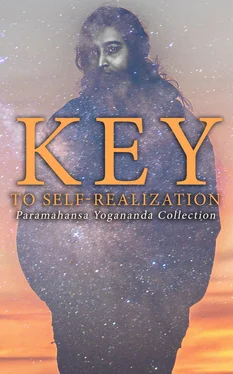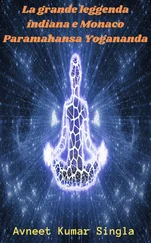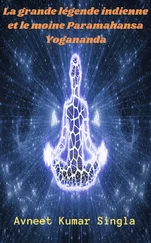"After you leave here today, an unusual experience will come your way."
I quitted the temple precincts and wandered along aimlessly. Turning a corner, I ran into an old acquaintance-one of those long-winded fellows whose conversational powers ignore time and embrace eternity.
"I will let you go in a very short while, if you will tell me all that has happened during the six years of our separation."
"What a paradox! I must leave you now."
But he held me by the hand, forcing out tidbits of information. He was like a ravenous wolf, I thought in amusement; the longer I spoke, the more hungrily he sniffed for news. Inwardly I petitioned the Goddess Kali to devise a graceful means of escape.
My companion left me abruptly. I sighed with relief and doubled my pace, dreading any relapse into the garrulous fever. Hearing rapid footsteps behind me, I quickened my speed. I dared not look back. But with a bound, the youth rejoined me, jovially clasping my shoulder.
"I forgot to tell you of Gandha Baba (Perfume Saint), who is gracing yonder house." He pointed to a dwelling a few yards distant. "Do meet him; he is interesting. You may have an unusual experience. Good-by," and he actually left me.
The similarly worded prediction of the sadhu at Kalighat Temple flashed to my mind. Definitely intrigued, I entered the house and was ushered into a commodious parlor. A crowd of people were sitting, Orient-wise, here and there on a thick orange-colored carpet. An awed whisper reached my ear:
"Behold Gandha Baba on the leopard skin. He can give the natural perfume of any flower to a scentless one, or revive a wilted blossom, or make a person's skin exude delightful fragrance."
I looked directly at the saint; his quick gaze rested on mine. He was plump and bearded, with dark skin and large, gleaming eyes.
"Son, I am glad to see you. Say what you want. Would you like some perfume?"
"What for?" I thought his remark rather childish.
"To experience the miraculous way of enjoying perfumes."
"Harnessing God to make odors?"
"What of it? God makes perfume anyway."
"Yes, but He fashions frail bottles of petals for fresh use and discard. Can you materialize flowers?"
"I materialize perfumes, little friend."
"Then scent factories will go out of business."
"I will permit them to keep their trade! My own purpose is to demonstrate the power of God."
"Sir, is it necessary to prove God? Isn't He performing miracles in everything, everywhere?"
"Yes, but we too should manifest some of His infinite creative variety."
"How long did it take to master your art?"
"Twelve years."
"For manufacturing scents by astral means! It seems, my honored saint, you have been wasting a dozen years for fragrances which you can obtain with a few rupees from a florist's shop."
"Perfumes fade with flowers."
"Perfumes fade with death. Why should I desire that which pleases the body only?"
"Mr. Philosopher, you please my mind. Now, stretch forth your right hand." He made a gesture of blessing.
I was a few feet away from Gandha Baba; no one else was near enough to contact my body. I extended my hand, which the yogi did not touch.
"What perfume do you want?"
"Rose."
"Be it so."
To my great surprise, the charming fragrance of rose was wafted strongly from the center of my palm. I smilingly took a large white scentless flower from a near-by vase.
"Can this odorless blossom be permeated with jasmine?"
"Be it so."
A jasmine fragrance instantly shot from the petals. I thanked the wonder-worker and seated myself by one of his students. He informed me that Gandha Baba, whose proper name was Vishudhananda, had learned many astonishing yoga secrets from a master in Tibet. The Tibetan yogi, I was assured, had attained the age of over a thousand years.
"His disciple Gandha Baba does not always perform his perfume-feats in the simple verbal manner you have just witnessed." The student spoke with obvious pride in his master. "His procedure differs widely, to accord with diversity in temperaments. He is marvelous! Many members of the Calcutta intelligentsia are among his followers."
I inwardly resolved not to add myself to their number. A guru too literally "marvelous" was not to my liking. With polite thanks to Gandha Baba, I departed. Sauntering home, I reflected on the three varied encounters the day had brought forth.
My sister Uma met me as I entered our Gurpar Road door.
"You are getting quite stylish, using perfumes!"
Without a word, I motioned her to smell my hand.
"What an attractive rose fragrance! It is unusually strong!"
Thinking it was "strongly unusual," I silently placed the astrally scented blossom under her nostrils.
"Oh, I love jasmine!" She seized the flower. A ludicrous bafflement passed over her face as she repeatedly sniffed the odor of jasmine from a type of flower she well knew to be scentless. Her reactions disarmed my suspicion that Gandha Baba had induced an auto-suggestive state whereby I alone could detect the fragrances.
Later I heard from a friend, Alakananda, that the "Perfume Saint" had a power which I wish were possessed by the starving millions of Asia and, today, of Europe as well.
"I was present with a hundred other guests at Gandha Baba's home in Burdwan," Alakananda told me. "It was a gala occasion. Because the yogi was reputed to have the power of extracting objects out of thin air, I laughingly requested him to materialize some out-of-season tangerines. Immediately the luchis 5-4 which were present on all the banana-leaf plates became puffed up. Each of the bread-envelopes proved to contain a peeled tangerine. I bit into my own with some trepidation, but found it delicious."
Years later I understood by inner realization how Gandha Baba accomplished his materializations. The method, alas! is beyond the reach of the world's hungry hordes.
The different sensory stimuli to which man reacts-tactual, visual, gustatory, auditory, and olfactory-are produced by vibratory variations in electrons and protons. The vibrations in turn are regulated by "lifetrons," subtle life forces or finer-than-atomic energies intelligently charged with the five distinctive sensory idea- substances.
Gandha Baba, tuning himself with the cosmic force by certain yogic practices, was able to guide the lifetrons to rearrange their vibratory structure and objectivize the desired result. His perfume, fruit and other miracles were actual materializations of mundane vibrations, and not inner sensations hypnotically produced. 5-5
Performances of miracles such as shown by the "Perfume Saint" are spectacular but spiritually useless. Having little purpose beyond entertainment, they are digressions from a serious search for God.
Hypnotism has been used by physicians in minor operations as a sort of psychical chloroform for persons who might be endangered by an anesthetic. But a hypnotic state is harmful to those often subjected to it; a negative psychological effect ensues which in time deranges the brain cells. Hypnotism is trespass into the territory of another's consciousness. Its temporary phenomena have nothing in common with the miracles performed by men of divine realization. Awake in God, true saints effect changes in this dream-world by means of a will harmoniously attuned to the Creative Cosmic Dreamer.
Ostentatious display of unusual powers are decried by masters. The Persian mystic, Abu Said, once laughed at certain fakirs who were proud of their miraculous powers over water, air, and space.
"A frog is also at home in the water!" Abu Said pointed out in gentle scorn. "The crow and the vulture easily fly in the air; the Devil is simultaneously present in the East and in the West! A true man is he who dwells in righteousness among his fellow men, who buys and sells, yet is never for a single instant forgetful of God!" On another occasion the great Persian teacher gave his views on the religious life thus: "To lay aside what you have in your head (selfish desires and ambitions); to freely bestow what you have in your hand; and never to flinch from the blows of adversity!"
Читать дальше












